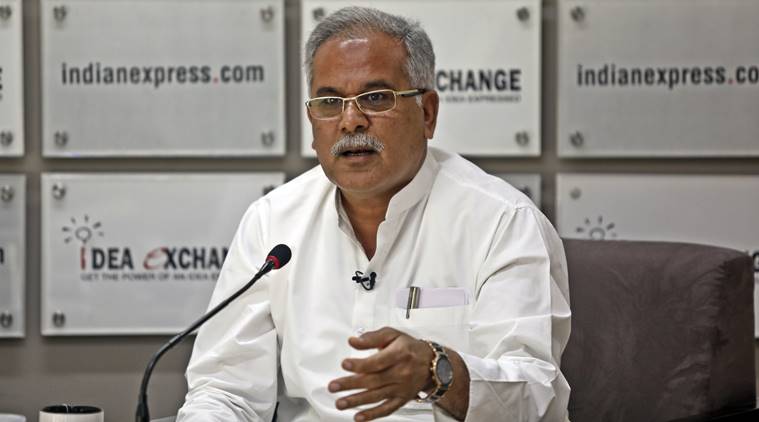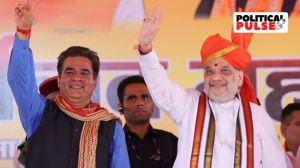- India
- International
Chhattisgarh’s Congress govt challenges NIA Act, a UPA-era law
The Chhattisgarh petition, filed through Senior Advocate Vivek K Tankha and Advocate Sumeer Sodhi, said the NIA Act, in its present form, not only takes away the state’s power of conducting investigation through police but also confers unfettered discretionary and arbitrary powers on the Centre.
 Chhattisgarh CM Bhupesh Baghel.
Chhattisgarh CM Bhupesh Baghel.
A day after Kerala invoked Article 131 of the Constitution to challenge the Citizenship (Amendment) Act in the Supreme Court, the Congress government of Chhattisgarh too cited the same provision to move the top court, challenging the Constitutional validity of the National Investigation Act, 2008. Incidentally, the Congress-led UPA was in power at the Centre when the law was enacted by Parliament.
The Chhattisgarh government’s petition, citing Article 131, contends that the NIA Act is ultra vires the Constitution and beyond the legislative competence of Parliament since the Act empowers the Centre to create an agency for “investigation” which, notwithstanding the NIA, is carried out by the State Police, a subject matter of the State under Entry 2, List II, Schedule 7.
Article 131 of the Constitution states “subject to the provisions of this Constitution, the Supreme Court shall, to the exclusion of any other court, have original jurisdiction in any dispute (1) between the Government of India and one or more States; or (2) between the Government of India and any State or States on one side and one or more other States on the other; or (3) between two or more States, if and in so far as the dispute involves any question (whether of law or fact) on which the existence or extent of a legal right depends: Provided that the said jurisdiction shall not extend to a dispute arising out of any treaty, agreement, covenant, engagements, and or other similar instrument which, having been entered into or executed before the commencement of this Constitution, continues in operation after such commencement, or which provides that the said jurisdiction shall not extend to such a dispute”.
The Chhattisgarh petition, filed through Senior Advocate Vivek K Tankha and Advocate Sumeer Sodhi, said the NIA Act, in its present form, not only takes away the state’s power of conducting investigation through police but also confers unfettered discretionary and arbitrary powers on the Centre. There are no rules governing the exercise of power which, it said, gives ample discretion to the defendant to exercise its power at any juncture without providing any reason or justification for the same.
“The provisions of the Act leave no room of coordination and pre-condition of consent, in any form whatsoever, by the Central government from the State government which clearly repudiates the idea of state sovereignty as envisaged under the Constitution of India,” it said.

“The scheme of NIA Act is such that once brought in motion, it completely takes away the power of a State to investigate the offences which have been categorised as scheduled offence under the NIA Act and which has been committed within the jurisdiction of the State.”
The petition said that its enactment by Parliament and creation of an “investigative” agency, namely the National Investigation Agency, for investigating the scheduled offences committed in any particular State, is clearly an act of colourable legislation. Incidentally, the Kerala petition against the validity of the CAA also calls it a colourable legislation.
By way of the Act, Chhattisgarh said, “Parliament has effectively created a ‘National Police’ which, in cases of investigation of scheduled offences, will have overriding control over the State Police and its investigation which is contrary to the scheme and intention of Distribution of Power as provided in Schedule 7 of the Constitution of India”.
In Raipur, Advocate General Satish Verma said, “When under the Constitution certain issues come under the state government, how can the central government arbitrarily interfere and take over the investigation? There should be equality before law. How can one case under UAPA be under purview of one agency and not others?”
He said the decision to file the case was taken by the government after reviewing several cases in the state, Verma said. “We have a list of 59 cases that the NIA could have taken up. They also had Naxal involvement and many people died in them. Yet, there was selective picking of cases,” he said.
The state government has already had its fair share of disagreements with the NIA. The agency had been investigating the Jhiram Ghati massacre in which several senior Congress leaders were killed by Naxals in an ambush. While NIA found no foul play, the state government formed an SIT and asked the NIA to share their investigation, which they haven’t yet.
“Before we came to power, we had promised the people that we will finally get the Jhiram Ghati case investigated. We have been asking them for the files and yet have got nothing,” state Congress spokesperson Shailesh Nitin Trivedi said. “We appreciate this step taken by the CM and his legal team. This is a step against the central government’s attempt to overpower state autonomy as per the Constitution,” he said.
The NIA is also investigating the murder case of BJP MLA Bhima Mandavi. “A person concerned with the Mandavi case has also filed a case against NIA investigation at the High Court in Bilaspur. But as a state government, our stand is wider,” Advocate General Verma said.
The BJP, on the other hand, called the Congress confused. Former Chief Minister Raman Singh said the government is going against its own Act. “The NIA Act was passed by the Congress-led UPA government in 2008. Why they are opposing their own party’s Act is beyond comprehension,” he said in a statement.
“The government is try to break down the structure by going against the central government. They have been trying to fool the public by creating opposition over nothing,” he said.
In January 2019, a month after the Congress came to power in the state after 15 years of BJP rule, it withdrew the general consent granted to the CBI for investigation in the state.
Apr 26: Latest News
- 0118 hours ago
- 0220 hours ago
- 037 hours ago
- 0420 hours ago
- 0520 hours ago








































